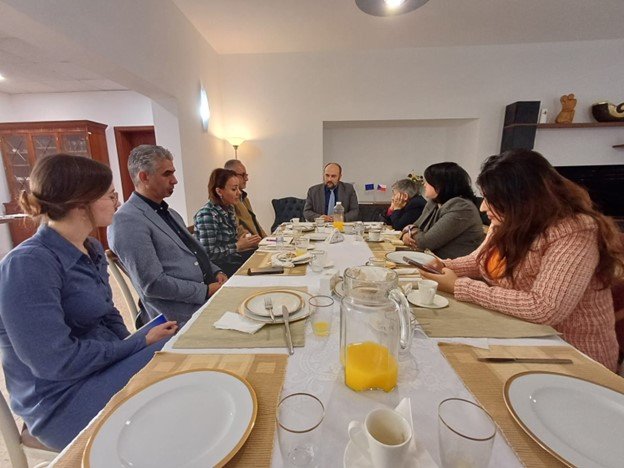
Discussion with Iraqi civil society on situation in the country
10.12.2024 / 15:11 | Aktualizováno: 19.12.2024 / 06:47
On the occasion of the Human Rights Day this year, the Czech Embassy in Baghdad invited representatives of Iraqi non-governmental organizations for a breakfast on 10 December 2024. This is Czechia’s tradition, inspired by a famous breakfast with Czechoslovak anti-communist dissidents, held in Prague in 1988 by the then president of France F. Mitterrand.
A number of personalities from Iraq’s civil society accepted the invitation of Ambassador Jan Snaidauf while five were able to attend. The Embassy was honored to host Ms. Hanaa Edwar of Iraqi Women Network, Ms. Sahar Jabbar of Tawasul Organization for Youth Empowerment, Mr. Isam al-Jiburi of Al-Basiqat Organization for Relief and Development, Ms. Ansam Khudair of ISEN Organization for Human Rights and Mr. Isam Nawaf of Aaile Alfurate Foundation. Ms. Claudia Spinelli of the EU Delegation also participated, having helped with the preparations. The Embassy thanks cordially to all participants for their valuable contributions.
Topics of the discussion included the situation of vulnerable social groups in Iraq, whether minorities or large population segments such as women and children. Participants mentioned that the work of activists, influencers and civil society representatives who shed light on existing issues in society is sometimes subject to defamatory or threatening campaigns – including on some occasions hate speech, lawfare (e.g. litigation for libel) and direct threats to personal safety and security (with several cases of actual murders). The ongoing and problematic process of amending Iraq’s Personal Status Law also featured prominently in the discussions.
Several observations and conclusions are put forward as the outcome from the meeting:
- There is a situation of ‘chronical crisis’, characterized by deliberate introduction of problems without solutions, corruption, culture of impunity and signs of a systemic failure.
- Human rights organizations need to act in a united and coordinated way in order to protect themselves and their members.
- The path to sufficiently guaranteeing human rights for everybody is long and difficult, with progress often mired by partial setbacks. The support of international community is important, although it is sometimes seen as too close to political decision-makers.
- Iraq should also look abroad for inspiration on good solutions. More contact and discussions with liberal democratic countries should be encouraged.
- The international community should be engaged on social issues in Iraq. It should be in contact with the Government on these matters, communicate publicly, and support the work of civil society that calls for solutions and positive changes.
Připravil: velvyslanec Jan Šnaidauf, Velvyslanectví ČR v Bagdádu




